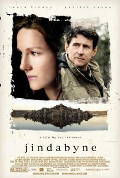
Directed by
Ray Lawrence
123 minutes
Rated MA
Reviewed by
Sharon Hurst


Jindabyne
Synopsis: Every year four men, Stewart (Gabriel Byrne), Carl (John Howard), Rocco (Stelios Yiakmis) and Billy (Simon Stone) from the town of Jindabyne in the Snowy Mountains region of New South Wales, go on a weekend fishing trip. They have barely begun their much-anticipated expedition when they find the body of a murdered Aboriginal girl floating in the river. Rather than cut short their weekend, they tether the body and only report it to police two days later. When they return, the reaction from the townsfolk is one of outrage. The men’s womenfolk struggle to understand why they did it and the men cannot see what they did wrong. Gradually past baggage of all the main characters begins to surface and relations are stretched to breaking point, especially those with the town’s indigenous residents.This much-awaited follow-up to director Ray Lawrence 's 2001 critical and commercial success, Lantana, does not disappoint. Based on a short story by Raymond Carver, 'So Much Water, So Close To Home', adapted to an Australian setting by first-time scriptwriter Beatrix Christian, it is a beautiful film not just in the sense of the natural beauty depicted, but also for the sensitivity Lawrence displays towards his characters and his complex themes. The ways in which the men and women see the incident are worlds apart and yet Lawrence wisely refrains from taking sides.
As in Lantana, the personal demons of the characters are intrinsic to the story and the town of Jindabyne, submerged to facilitate the Snowy Mountains Hydro-Electric Scheme, serves as an eerie and melancholy metaphor for much of the tragedy and disappointment that has beset the characters now living in the new relocated township. All of them are just ordinary people and Lawrence who is expert at dealing with such subject matter, coaxes performances that are persuasive and naturally moving with the women wearing minimal make-up and Christian's script eschewing the conventional thrills that Hollywood would impose on the story. And because his cinematographer David Williamson (needless to say not the well-known Australian playwright) shoots with natural light the realism is maximized.
Although I have no idea why Gabriel Byrne and Laura Linney were cast in the leads instead of Australian actors they do quietly impressive jobs. Byrne as Stewart, in probably the best screen performance he has yet given, takes us on a credible emotional journey. As his wife, Claire, a troubled soul (post-natal depression is hinted at) Linney is even more effective in bringing home the conflicts of her character without a note of exaggeration. Together they explore the limits of a marriage in which pain and fundamental differences of world view have still not destroyed a deep underlying love.
Equally fine are the supporting women. Jude, Carl’s wife (Deborah-Lee Furness) is looking after her wild young grieving granddaughter Caylin-Calandria (Eva Lazarro), after the mother has died (why is not explained). Carmel (Leah Purcell), Rocco’s girlfriend, is the local teacher, whose own indigenous heritage creates issues in her relationship with whitefolk once the body is found. Billy’s girlfriend Elissa (Alice Garner), Stewart’s Mum Vanessa (Betty Lucas), his son Tom (Sean Rees Wemyss) and the killer Gregory (Chris Haywood) also carry off their smaller roles effectively.
From the opening shot of the rocks behind which the killer hides a brooding silence pervades all. The significance of the site to the local aboriginal community also adds another dimension to the film's unsettling tone. The uniqueness of the setting and its stark beauty counterpoints the losses, secrecy and sadness in the various characters lives. With a haunting score by singer/songwriter Paul Kelly, Jindabyne is one of the year’s best.
Want something different?





